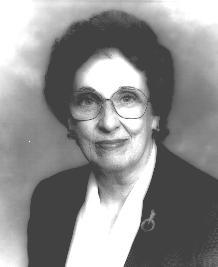Page 126
[Begin Tape 1, Side A]
Clark: I wanted to ask you if you had any particular experience in covering Phyllis Schlafly, if you'd realized, you know, what she was about from the beginning—or if anyone really realized the impact she would have in the movement.
Shanahan: I'm not sure anybody really realized the impact she would have, although I was aware of her through some of my women journalist friends who had covered her effort to take over the Federation of Republican Women's Clubs back some years earlier. And the more moderate group did defeat her and put their own candidate in as the head of it. But they came away from that with a sense of this being a really smart, really vicious, really wrong-headed woman, and came away from it with a real deep-down dislike of her and fear of her, even though she'd gotten defeated in that instance.
So I had known something about her through them. But I don't think anybody—there were a lot of things we didn't understand. I think basically we didn't understand the depth and breadth of feeling in the country that women aren't equal, shouldn't be equal, would destroy the country if they became legally equal, et cetera. That runs deep to this very day. Look at the antagonism toward Hillary Rodham Clinton. I got a letter to me, not a piece of nut mail, a civil letter criticizing a story I had recently written about Clinton and the budget, which said, "Before you go too far in your admiration of the Mr. and Mrs. Clinton administration." Obviously this guy thinks it's terrible that she's not a traditional first lady.
So I did have some sense of Phyllis Schlafly. I didn't know that she would turn out to be the good organizer, the really brilliant spokeswoman for her point of view. She's a very pretty woman, which unfortunately matters, and speaks well and knows how to flirt with senators in a way that you couldn't quite blow the whistle on. But she has these beautiful blue eyes and knows how to kind of look up at men and laugh and make them feel masculine and strong and all those things which so many of the leaders of the women's movement just eschewed. They were having no parts of it, to the point where some of them were outright rude, which was counterproductive. But others just had decided that their self-image and self-respect didn't allow them to play that game—a view I share. And she knew how to play it superbly. She's a very smart woman and she knew how to tap all of the latent fears of everything that was represented by the goals of the women's movement, and did it very successfully.
I don't think there's too much doubt that the ERA would have gotten ratified if there had never been a Phyllis Schlafly. Maybe someone else would have risen to do the same job. But it's hard to see how there could have been somebody else with an equal talent and skill at that sort of thing. And of course, she had a rich husband who could pay all the mailing costs and various things. There were always a lot of rumors that she was supported by certain industrial interests. And I tried to—the insurance industry, in particular, which I spent a little time trying to track down. Ms. magazine spent a lot of time and nobody's able to prove it, so maybe it's not so. I'm inclined to think if some good reporters tried to find it and didn't find it, it probably was not there, at least, not in any comprehensive or national way.
My relationship with Schlafly is interesting. I called her and talked to her and quoted her at length. I knew—I think the first time I ever quoted her—and the first time her picture was ever in the New York Times was probably '73. I remember the story very well. ERA ratification was moving along a-pace in what we only subsequently recognized were all the easy states. I talked to her and she said—it may have been the story that I wrote, that began that ERA ratification was no longer assured. She said, "As people understand the issues,

